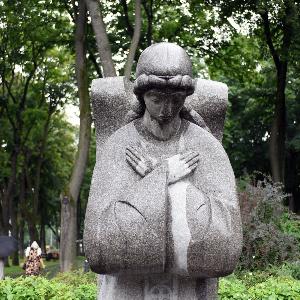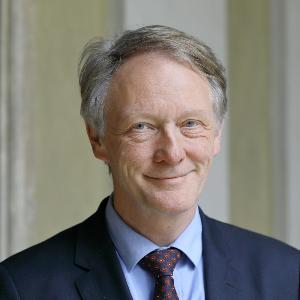UCU-LMU center: violence research in the shadow of violence
15 Oct 2024
Interview with historian Martin Schulze Wessel about the new German-Ukrainian center for historical research.
15 Oct 2024
Interview with historian Martin Schulze Wessel about the new German-Ukrainian center for historical research.

One of the two statues of angels that frame the entrance of the National Museum of the Holodomor-Genocide, Kyiv | © picture alliance / Photoshot | Kaniuka Ruslan / Avalon
The inaugural conference of the German-Ukrainian center for historical research will take place in Lviv on 17 and 18 October. Funded by the German Federal Ministry of Education and Research, the UCU-LMU Mykola Haievoi Center for Modern History will study mass violence and strengthen cooperation between LMU Munich and the Ukrainian Catholic University (UCU) in Lviv. In our interview, Professor Martin Schulze Wessel, who heads the center from the Munich end and holds the Chair of Eastern and South Eastern European History at LMU, discusses the challenges and opportunities of scholarly collaboration in the shadow of war.
The new UCU-LMU research center for mass violence will open its doors in October. Can we even celebrate this event in the middle of a war?
Martin Schulze Wessel: It’s a difficult situation. Although Lviv is located in western Ukraine, far removed from the front, it is subject to regular attacks. When we were there for planning discussions last year, an air-raid siren went off during the night and we had to take refuge in cellars. The researchers and students on the campus there are used to this, as there are air-raid alarms about twice a week. This illustrates how even cities far behind the front are suffering from Russian attacks. So we’re not treating the opening as a celebration as such, but as a conference, which some of us will travel to Lviv to attend in person.
Our research will address the many facets of German and Soviet mass violence – hunger as a weapon; forced labor; the deportation, particularly of women, from Ukraine to Germany; the crimes of the German occupiers; and the Holocaust.Martin Schulze Wessel
Which topics will be jointly researched at the center?
The center will concentrate on the history of violence in the 20th century, from the Soviet Holodomor, the major famine caused by Stalin in Ukraine, to the violence committed by the German occupying forces during the Second World War. Both the Soviet Union and Nazi Germany viewed Ukraine as a colonial project of exploitation and extermination. Our research will address the many facets of German and Soviet mass violence – hunger as a weapon; forced labor; the deportation, particularly of women, from Ukraine to Germany; the crimes of the German occupiers; and the Holocaust.
To what extent will the research into past violence be influenced by present violence?
In a ghastly manner. Two scholars who were due to take part in our project volunteered for service at the front. One of them, Mykola Haievoi, was killed in action on 26 August. We were all very moved by his death. The center will be named after our deceased colleague: the UCU-LMU Mykola Haievoi Center for Modern History.

© Historisches Kolleg
What will be the main focuses of research?
We’re not interested only in the broad lines of history – we also want to carry out regional studies. The goal is to gain a better understanding of the mechanisms of how power was exercised and how Ukrainians dealt with it in their everyday lives.
Oleksandr Kruglov from the Babyn Yar Holocaust Memorial Center in Kyiv is investigating the German perpetrators of crimes during the occupation, with a particular focus on the city of Kyiv.
Meanwhile, the regional aspect of the research approach is typified by a study that was initiated before the project started – the dissertation of Tobias Wals here in Munich, which looks at the survival of Jews in the Ukrainian city of Zhytomyr during the Second World War. A considerable number of Jews survived the Holocaust. Some of them did so by fighting on the side of the Red Army, or moving to the Soviet hinterland, or, more rarely, hiding under the German occupation. Tobias Wals explores the question as to how this affected individuals and their Jewish identity.
Could you give some more examples of individual projects?
Professor Yaroslav Hrytsak from the Ukrainian Catholic University, who heads the new center from the Ukrainian end, will write a biography of the controversial Ukrainian politician Stepan Bandera. Albert Venger from Oles Honchar Dnipro National University is investigating collaboration between the Ukrainian population and the German minority with the German occupying force, as well as the Soviet prosecution of collaborators from the 1940s to the 1980s. Yuri Shapoval from the Ukrainian National Academy of Sciences in Kyiv is researching the activity of the Soviet secret police in Ukraine in the 1920s and 1930s. And finally, I myself am writing a history of the relations between Germany and Ukraine in the 20th century.
What significance does the new center have for German-Ukrainian relations in the realm of historical scholarship?
It’s a pioneering project. Apart from the German-Ukrainian Historical Commission, which Yaroslav Hrytsak and I founded in 2015, i.e. after the Russian annexation of Crimea in violation of international law and the start of the Russo-Ukrainian war, there are no other institutional links in the field of historical research between German and Ukrainian universities or institutes. German historical scholarship has long had many ties to Poland – and indeed to Russia before 2022 – but not to Ukraine. The new center will close this gap.
We want to increase awareness. In Germany, people generally do not know much about Ukraine, particularly about its history of violence in the 20th century.Martin Schulze Wessel
What are its non-academic goals?
We want to increase awareness. In Germany, people generally do not know much about Ukraine, particularly about its history of violence in the 20th century. We’re planning to organize exhibitions and events in collaboration with museums and documentation centers such as the Nazi Documentation Center in Munich and the Holodomor Museum in Kyiv. Furthermore, we’re going to engage with schools to teach the history of genocide. In particular, we need to consider Soviet and German violence in conjunction – an approach that was avoided for a long time.
What’s the condition of Ukrainian historical scholarship now compared to before the war?
In general, Ukraine has a vibrant scene of historical scholarship, with keen interest in undertaking new research, especially among the younger generation. The war drove many researchers out of the country, some of whom received bursaries and grants here in Munich, for example. Thus, the conflict has certainly led to an internationalization of Ukrainian historical scholarship – in Europe and beyond. In the United States, where I just had a research residency, I was able to present our new center in Princeton and was delighted at the lively interest it prompted. But whether this internationalization will enrich historical scholarship in Ukraine in the long term – by the researchers returning to their home country, for instance – will only be known after the war.
The cooperation project is located at the Chair of Eastern and South Eastern European History at LMU and the Ukrainian Catholic University in Lviv. It has been granted funding of 2.5 million euros over a period of four years by the German Federal Ministry of Education and Research (BMBF). The center is part of a pioneering project designed to strengthen academic cooperation between Germany and Ukraine. BMBF is funding four such centers in total – in the domains of history, quantum physics, plasma technology, and natural product research.